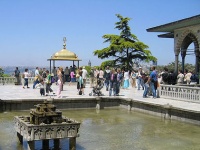 Istanbul OverviewThe splendid city of Istanbul has many unique and fascinating
features. It is the only city in the world reaching across two
continents, with its old city in Europe and modern Istanbul
situated in Asia, separated by the Bosphorus Strait. It is also
unique in having had capital status during two successive empires,
Christian Byzantine and Islamic Ottoman, and the legacy from both
is visible in the modern city today. Istanbul's location on the water made it a much coveted site as
a commercial shipping port and military lookout, and as capital of
the Roman Empire, Constantinople, as it was known, became extremely
desirable as a centre of world trade, until Mehmet the Conqueror
claimed it for the Ottoman Empire in 1453 and it became the
imperial seat of the sultans. After the War of Independence the
capital was moved to Ankara, but Istanbul still remains the
commercial, historical and cultural heart of Turkey today. The charm and character of Istanbul lies in its endless variety
and jumble of contradictions. Its fascinating history has
bequeathed the city a vivid inheritance of Byzantine ruins,
splendid palaces, ancient mosques and churches, hamams
(bath-houses) and exotic bazaars. Modern Istanbul exudes trendy
bars and nightclubs, western boutiques, office blocks, and elegant
suburbs. The call to prayer heralds the start of each day and the
city comes to life with over 11 million residents forming a chaotic
social and cultural mix of unscrupulous carpet merchants, wealthy
shoppers, religiously veiled women and destitute beggars. Joining
the noisy throng are over-awed tourists and those capitalising on
the tourist trade. |